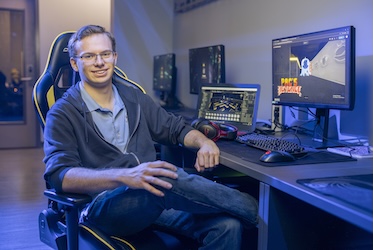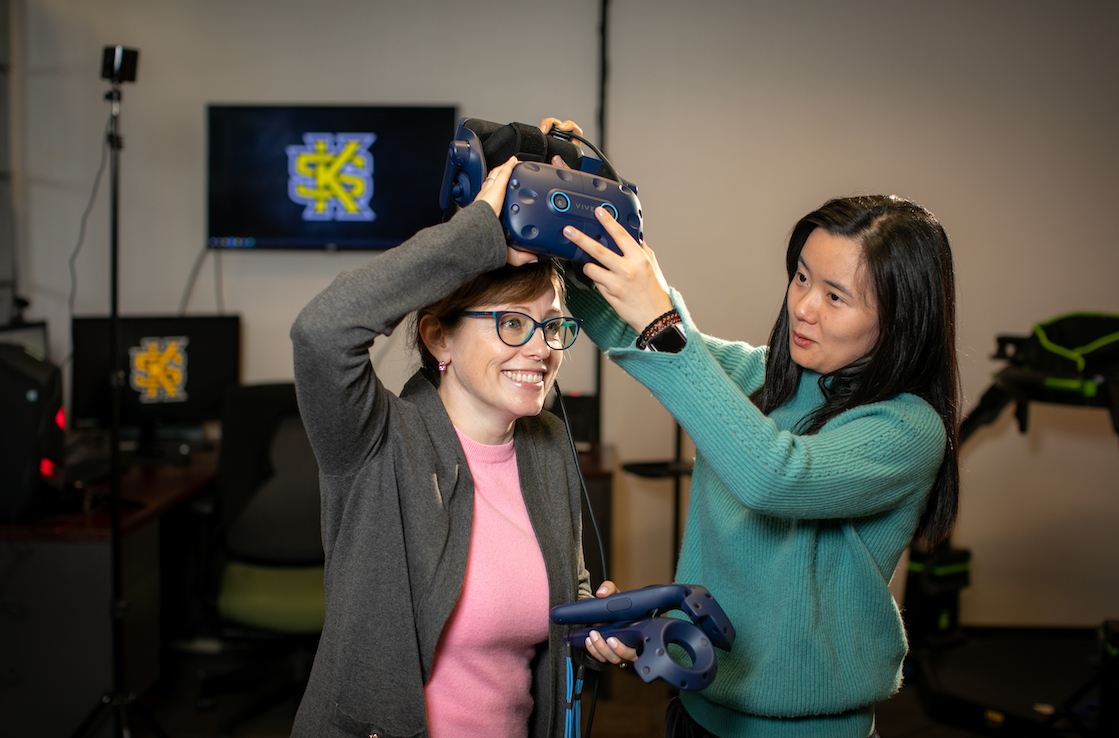
Virtual Insight
MARIETTA, Ga. | Feb 25, 2020
Game design students develop virtual training tool for medical students
Among the many skills medical students must learn by the end of their educational journey is the ability to empathize with patients. To help them better understand those they will serve, students in Kennesaw State University’s game design degree program are developing a state-of-the-art virtual reality (VR) simulation that offers a glimpse inside the head of someone suffering from Parkinson’s disease.
The simulation, built by students in Kennesaw State’s Department of Software Engineering and Game Design and Development for their counterparts at Augusta University’s Medical College of Georgia, is the result of several months of research and testing between the state’s only accredited game design program and only public medical school. Originally a student project developed in the serious and educational game design course taught by KSU professor Joy Li, it is now being tested by first- and second-year medical students studying clinical skills as a potential method of building empathy toward patients afflicted by tremor-based neurological disorders.
“The best thing about this project is the fact it solves an existing problem that we might not have otherwise identified,” said Li, an assistant professor of computer game design and development in the College of Computing and Software Engineering. “As a professor, we are limited in our scope given our background in game design, but by collaborating with other experts, we are able to expand the potential applications of the technology we can create. That is a tremendous asset to our students as they work to design the game.”
Inside the simulation, users are tasked with completing a typical morning routine – turning off an alarm clock, taking medicine out of a bottle and cooking breakfast – all while their hands tremble similarly to those of someone with Parkinson’s disease. The project was initiated by Elena Wood, associate professor and assistant course director for physical diagnosis at Augusta University, as an innovative way to demonstrate the difficulties associated will the disease.
Wood said the idea to integrate the technology into a course originally came to her after using a VR headset provided by a colleague. A team from the Medical College of Georgia, composed of Wood, associate professor Shilpa Brown, associate professor Wanda Jirau-Rosaly and assistant professor Nicole Winston later decided to explore using the technology to simulate tremors.
“We are constantly looking for ways to improve our coursework, and I have always gravitated toward using more technology,” said Wood, whose son studies electrical engineering at Kennesaw State. “This collaboration seemed like a natural fit with two of the state experts in their respective fields, and I have been really impressed to see undergraduate students handle this level of responsibility.”
Among the students who assisted in the project was Cody Ducleroir. Currently completing a degree in computer game design and development, he has continued develop the simulation as a directed study under Li. Among the challenges, he said, were determining ways to make the user’s hands tremble in a lifelike manner while identifying tasks that highlight the difficulties associated with the disease.
A lifelong gamer, Ducleroir said the project has shown him the breadth of the game design industry.
“This process has really opened up my eyes,” he said. “When you’re growing up, you tend to gravitate toward what you consider to be a fun game rather than a purely educational game. Figuring out how to make educational games more fun and engaging has been one of the rewarding parts of this project. This has certainly opened up more avenues for potential employment.”
– Travis Highfield
Photos by Jason Getz
Related Stories

Kennesaw State to revive bathtub race tradition with new video game

Kennesaw State student develops AI tools to help first responders diagnose behavioral health issues

Kennesaw State computer game design student launches studio, first video game

Kennesaw State student integrates artificial intelligence into architectural design education
A leader in innovative teaching and learning, Kennesaw State University offers undergraduate, graduate, and doctoral degrees to its more than 47,000 students. Kennesaw State is a member of the University System of Georgia with 11 academic colleges. The university’s vibrant campus culture, diverse population, strong global ties, and entrepreneurial spirit draw students from throughout the country and the world. Kennesaw State is a Carnegie-designated doctoral research institution (R2), placing it among an elite group of only 8 percent of U.S. colleges and universities with an R1 or R2 status. For more information, visit kennesaw.edu.
















